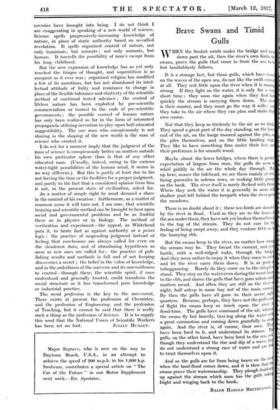Brave Swans and Timid Gulls
WHEN the freshet swirls under the bridge and ram down past the nit, then the river's own birds, t swans, prove the gulls that come in from the sea to be but landlubberly fellows.
It is a strange fact, but those gulls, which have toss on the waves of the open sea, do not like the swift curter, at all. They rest little upon the river when it is ruin strong. If they light on the water, it is only for a very short time ; they soon rise again when they find ho quickly the stream is carrying them down. The riv is their master, and they must go the way it wills ; a they take to the air where they can plan and make the own course.
Not that they keep so tirelessly to the air as we think They spend a great part of the day standing, on the lore end of the ait, on the barge moored against the piles, o the piles themselves, and on the little landing stage They like to have something firm under their feet, an their preference is for smooth wood.
Maybe about the lower bridges, where there is greate expectation of largess from man, the gulls do seen t whirl giddily in the air the whole day through. 13n up here, nearer the tidehead, we see them mainly at rest lining gunwales in solemn rows, or making little grou on the bank. The river itself is rarely flecked with them Where they seek the water it is generally in some st shallow pool left behind the towpath when the river gar the meadows.
There is no doubt about it ; these sea-birds are daunt by the river in flood. Used as they are to the heave the sea under them, they have not yet broken themselves to the tug of the- stream. They do not care for th feeling of being swept away, and they venture little on t the hurrying ebb.
But the swans keep to the river, no matter how stro the stream may be. They breast the current, and el battle, with a well-ridged wake, through the bridg And they seem rather to enjoy it when they cease to sr and let the river carry them down. It is as good tobogganning. Rarely do they come on to the shingle stand. They stay on the water even during the worst lieu to the ebb, and shame the gulls that have gone ashore tint matters mend. And often they are still on the river night, half asleep in some bay Out of the main curren By then the gulls have all gone to their secret nigh quarters. Because, perhaps, they have not the gull's ea' of flight the swans keep so much upon the river flood-time. The gulls have command of the air, wherea the swans fly but heavily, taxi-ing along the water Wit a great commotion and coming down gratefully to sw again. And the river is, of course, their own. The have been bred to it, and understand its stream. T gulls, on the other hand, have been bred to the sea, all though they understand the rise and dip of a wave, the do not understand a strong race of water and are ho to trust themselves upon it And so the gulls are far from being brave on the riv when the land-flood comes down, and it is then that t swans prove their watermanship. They plough fearless! up against the stream which soon has the gulls talo fright and winging back to the:bank.- lit . RALPH HAROLD -BRTTRERTON'






























































 Previous page
Previous page